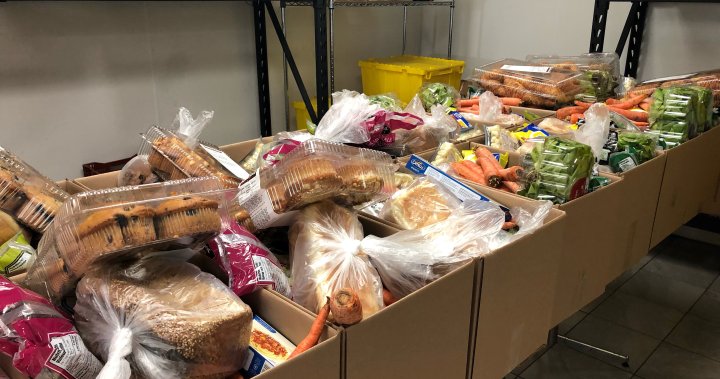Canada
‘Very nerve-wracking’: Nova Scotia charities brace for impact of U.S. tariffs

The Economic Challenges Facing Halifax Charities Amid Trade Tensions
The Halifax region is bracing for potential economic fallout as U.S. President Donald Trump’s proposed 25% tariff on Canadian goods looms large. This policy shift has sparked concern among local charities, which are already grappling with the rising cost of living and increased demand for their services. For many residents, making ends meet has become a daily struggle, and the added burden of higher prices threatens to push more families into financial hardship. Charities, which serve as a lifeline for vulnerable populations, are growing increasingly worried about their ability to meet the growing needs of their communities.
The Struggle to Meet Rising Demand
Local charities, such as the Parker Street Food & Furniture Bank, have reported a significant surge in demand for their services since the beginning of the year. Romaine Rhoden, a spokesperson for the organization, expressed the anxiety felt by many in the non-profit sector: “It’s very nerve-wracking for us. We’ve already seen a significant shift in terms of demand. More people are coming to us for food support—specifically food support.” This trend underscores the growing food insecurity in the region, as inflation and stagnant wages force many families to rely on charitable aid just to get by.
Beacon House, another key player in the region’s social safety net, is also feeling the strain. Operating a food bank, thrift store, and shelter, the organization currently serves approximately 1,500 people each month—a number that continues to climb. The leadership of Beacon House acknowledges the challenges ahead but remains determined to adapt to the needs of the community. “If the cost of food goes up, the cost of fuel, we’re well prepared—or getting prepared—to take care of those numbers,” said Jim Gunn, board chair of Beacon House Interfaith Society.
A Glimpse into the Crisis
The stories emerging from these charities paint a vivid picture of the struggles faced by many families in Halifax. For those living paycheck to paycheck, even small increases in the cost of essentials like food and fuel can have devastating consequences. Food banks, which rely on donations and volunteers, are finding it increasingly difficult to keep up with demand as inflation erodes purchasing power. The proposed tariff on Canadian goods only exacerbates these challenges, as imported items become more expensive and supply chains are disrupted.
Charities are not just concerned about the immediate impact of the tariff but also about the long-term effects on the community. As more families struggle to afford basic necessities, the demand for services is expected to rise further. This places additional pressure on organizations that are already operating with limited resources. The situation is particularly dire for vulnerable populations, including low-income families, seniors, and those experiencing homelessness.
Strength Amidst the Struggles
Despite the challenges, the resilience and determination of Halifax’s charitable sector remain a source of hope. Organizations like Parker Street Food & Furniture Bank and Beacon House are stepping up their efforts to prepare for the potential fallout from the tariff. Staff and volunteers are working tirelessly to stockpile supplies, secure additional funding, and explore new ways to support those in need. Their efforts are a testament to the compassion and solidarity that define the community.
However, the realities of the situation cannot be ignored. The rising cost of living, coupled with the uncertainty of trade policies, has created a perfect storm of challenges for charities and the people they serve. As the situation continues to unfold, one thing is clear: the need for support has never been greater.
A Call to Action
The escalating demand for charitable services in Halifax highlights the urgent need for collective action. While local organizations are doing their best to address the crisis, they cannot shoulder the burden alone. Governments, businesses, and individuals must come together to provide the necessary resources and support. Whether through donations, policy reforms, or community initiatives, every effort counts in helping families navigate these difficult times.
The proposed tariff on Canadian goods serves as a stark reminder of the interconnectedness of our economies and the far-reaching consequences of political decisions. As Halifax charities continue to advocate for those in need, their work underscores the importance of compassion, solidarity, and advocacy in building a more equitable society.
The Broader Implications
The challenges faced by Halifax’s charitable sector are part of a larger narrative about the growing inequality and financial instability in Canada. As costs rise and wages fail to keep pace, more families are being pushed to the brink. The proposed tariff on Canadian goods is just one of many factors contributing to this Perfect storm of economic uncertainty. For charities, the focus remains on providing immediate relief, but the long-term solution lies in addressing the root causes of poverty and food insecurity.
In the face of these challenges, the resilience and determination of Halifax’s charitable organizations offer a powerful reminder of the strength of the human spirit. While the road ahead is uncertain, one thing is clear: the work of these charities is more vital than ever. As the community comes together to support those in need, the hope is that their efforts will inspire broader change and create a more sustainable future for all.